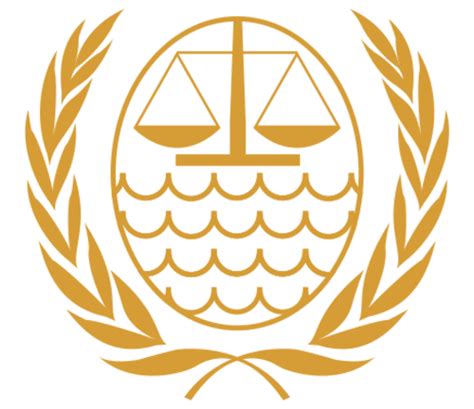 The International Tribunal for the Law of the Sea (ITLOS) is an independent judicial body established by the 1982 United Nations Convention on the Law of the Sea. It has jurisdiction over any dispute concerning the internpretation or application of the Convention, and over all matters specifically provided for in any other agreement which confers jurisdiction on the Tribunal. Disputes relating to the Convention may concern the delimitation of maritime zones, navigation, conservation and management of marine living resources, protection of the marine environment and marine scientific research.
The International Tribunal for the Law of the Sea (ITLOS) is an independent judicial body established by the 1982 United Nations Convention on the Law of the Sea. It has jurisdiction over any dispute concerning the internpretation or application of the Convention, and over all matters specifically provided for in any other agreement which confers jurisdiction on the Tribunal. Disputes relating to the Convention may concern the delimitation of maritime zones, navigation, conservation and management of marine living resources, protection of the marine environment and marine scientific research.
The Tribunal is open to State Parties to the Convention. 169 states are members to the Convention, but not e.g. the US or Turkey, even though these non-member states may follow some of the Law of the Sea (LOS) provisions of part XV as a model for agreement on maritime issues or follow procedures set up through advice or jurisdictions of the Tribunal. Entities other than States Parties, such as state enterprises and private entities, may also have access to the Tribunal in any case expressly provided for in Part XI of the Convention, which deals with the regime of seabed mining, or in any case submitted prusuant to any case submitted pursuant to any other agreement which confers jurisdiction to the Tribunal. The Law of the Sea Convention was opened for ratification in 1982 and entered into force in 1994.
Three new international bodies were created under LOS: (a) the Commission on the Limits of the Continental Shelf (New York), (b) the International Seabed Authority (Jamaica), and (c) the International Tribunal for the Law of the Sea. The first judges were appointed on August 1, 1996.
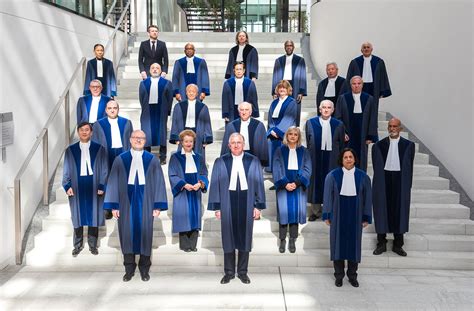
The 21 Judges of the Tribunal are elected by the States Parties to the Convention from among persons with recognised competence in the area of LOS and enjoying the highest reputation for fairness and integrity. The Judges are supported by the Registry, an international secretariat. The seat of the Tribunal is Hamburg. The current president is Tomas Heidar, Iceland, vice-president is Neeru Chadha, India. They were elected end 2023 for three years. The list of current and former Judges is here.
The German government provided the spacious and very functional building in the villa and beautiful park of a former banker in Hamburg Altona (see aerial photo below).
The Tribunal addressed its first case in 1997. The Judges are elected for nine years with a possibility of reelection. Seven positions of judges are up for election every three years in a geographically balanced mode. There shall be no fewer than three members from each geographical group as established by the General Assembly of the United Nations (African States, Asian States, Eastern European States, Latin American and Caribbean States and Western European and Other States). The official working languages are English and French. For.dealings in other languages translators and interpreters are engaged as the need arises.
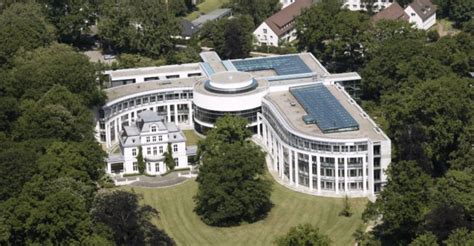
Participants of the Conference of young marine researchers (YouMarRes14) of the German Association of Marine Science (DGM) had the opportunity to visit ITLOS as a side event. They were welcomed and briefed charmingly and competently by Julia Ritter of the Press Office. As the visitors were listening to her explanations, they saw almost all Judges coming out of the building and strolling to the villa or another part of the building.
Julia explained the different ways governments have in order to address disputes over maritime matters.
For disputes between States Parties to the UN Law of the Sea Convention, ITLOS is the venue. The Jurisdiction of the Tribunal is binding. It can not be enforced through police-like instruments, but international pressure usually ensures at least partial compliance. The Tribunal can also be called upon for an Advisory Opinion, such as the request for an Opinion about the obligations of the flag State in cases where illegal, unreported and unregulated (IUU) fishing activities are conducted within the exclusive economic zone (EEZ) of a third party by the Sub-Regional Fisheries Commission (SRFC) representing Mauritania, Senegal, Cape Verde, The Gambia, Guinea Bissau, Guinea and Sierra Leone. Costs are borne by LOS parties.
For disputes involving also states that are not parties to LOS, the International Court of Justice in The Hague is the venue of choice, like in the case brought by the Philippines against China's claims for most of the South China Sea. The 15 Judges are elected by the UN Security Council and the General Assembly. In this specific case, however, Judges from ITLOS were called upon by the International Court of Justice because of their expertise. Costs are covered by the UN Member States.
Under Annex VII and VIII of LOS arbitral tribunals are created ad hoc to adjudicate on one specific dispute. The location, judges and procedure need to be decided upon by the parties to the dispute. They must also cover all costs.
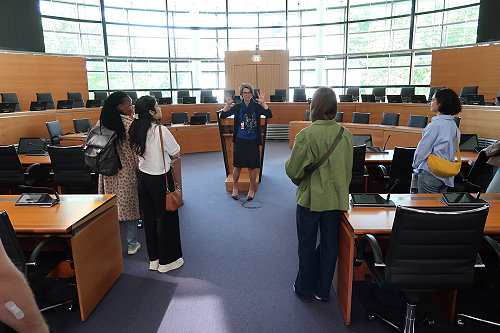 |
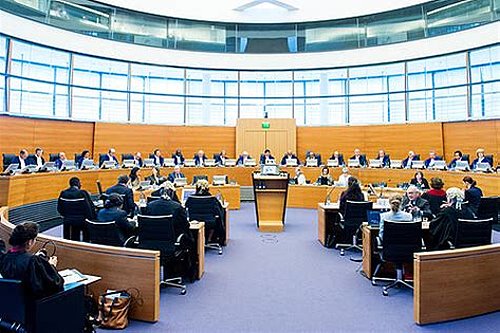 |
| Julia Ritter explains Tribunal configurations to YouMaRes visitors | The Tribunal in session (courtesy ITLOS) |
Judges are not permanently in Hamburg as they can study often extensive case documentation in their home country. But they always come together for hearings and deliberations.
Once a year the UN General Assembly holds a meeting about developments around the Law of the Sea including derived agreements. A recent case for an implementing agreement is the' Agreement on the Conservation and Sustainable Use of Marine Biological Diversity of Areas beyond National Jurisdiction (BBNJ)' for article 60. Multilateral agreements were also already negotiated under LOS, e.g. the 'Convention on the protection of the underwater cultural heritage'. Bilateral agreements are e.g. the 'Delimitation of the Maritime Frontier between Cabo Verde and Senegal' or the 'Agreement between Norway and Belgium concerning the laying of the gas pipeline 'norfa'.'
In 2021 Mundus maris conducted an interview with Prof. Alexander Proelss who has marshalled a major commentary with leading experts on the Law of the Sea. An updated version is under preparation. This vast body of legal provisions has far reaching implications in many economic, political, environmental and scientific areas around the globe and is in constant need for fresh interpretation in response to new constraints and opportunities, technologies and political developments.
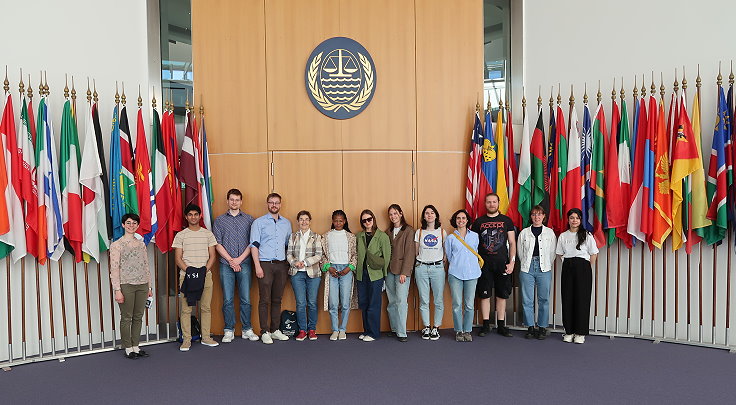
At the end of an inspiring visit the group of YouMaRes participants thanked Julia Ritter and posed for a group photo in front of the court room.
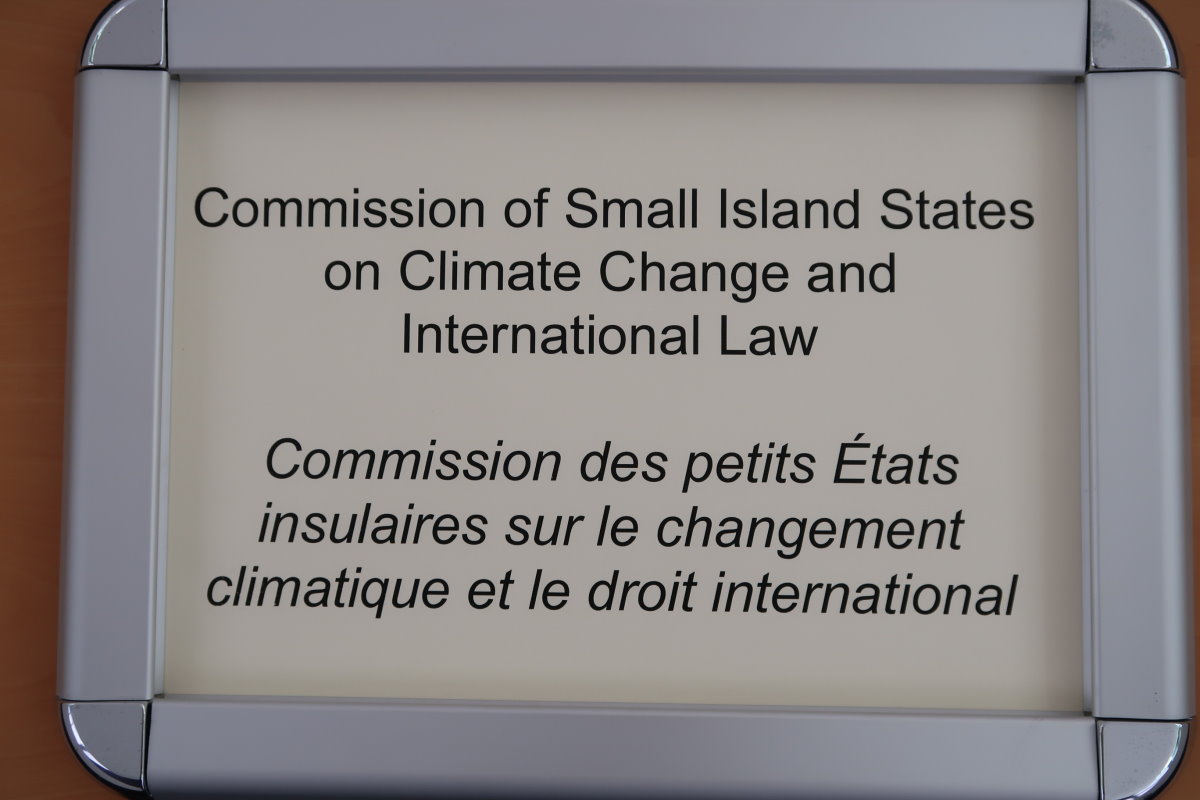 Inside, on Tuesday, 21 May 2024 at noon, at a much awaited public sitting in the main courtroom, the case of the Request submitted to the Tribunal by the Commission of Small Island States on Climate Change and International Law will find its conclusion. A special Commission dealt with the case.
Inside, on Tuesday, 21 May 2024 at noon, at a much awaited public sitting in the main courtroom, the case of the Request submitted to the Tribunal by the Commission of Small Island States on Climate Change and International Law will find its conclusion. A special Commission dealt with the case.
Judge Albert Hoffmann, who presides over the case, will read the Tribunal's Advisory Opinion. The history and extensive material and submissions by a wide range of interested countries and civil society organisations which have submitted their inputs are all available on the webpage of the case (No. 31). Interest by the diplomatic corps, the general public and the media is naturally very high.
The reading of the advisory opinion will be broadcast live on the website. The text of the advisory opinion will be available shortly after its delivery on the website of the Tribunal and a recorded webcast of the reading will be made available thereafter in the webcast archives.








